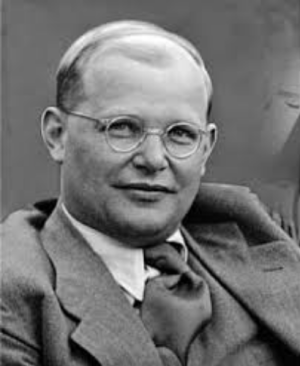In Memoriam, Dietrich Bonhoeffer, Theologian, Martyr, 1906-1945
Over the two millennia of the Church's existence we have been surrounded by a great cloud of witnesses to Jesus Christ, in whom the grace of God has been palpable. Though all of them are of equal dignity, some are better known to us than others. One of these witnesses is the German Lutheran theologian Dietrich Bonhoeffer, the 75th anniversary of whose death the Church commemorates during Holy Week of 2020.
 There are many reasons to remember the gift of Bonhoeffer’s witness, in which his life and thought are inextricably intertwined. I have found it helpful to view his life in terms of three chronological phases. First there is his academic period of studying and teaching at Berlin University from 1924-1932, where he laid the theological foundation for his future work,. The second phase (1933-1940), which I call his pastoral period, was devoted to biblical study, mainly in the context of the Confessing Church, which arose in Germany in opposition to the Nazi government’s efforts to control the Protestant church,. The last five years of his life I would call his political period when he served as a double agent for German military intelligence and engaged in profound ethical reflection and action, the last two years while imprisoned. Each of these sequential phases of his life enriches the next.
There are many reasons to remember the gift of Bonhoeffer’s witness, in which his life and thought are inextricably intertwined. I have found it helpful to view his life in terms of three chronological phases. First there is his academic period of studying and teaching at Berlin University from 1924-1932, where he laid the theological foundation for his future work,. The second phase (1933-1940), which I call his pastoral period, was devoted to biblical study, mainly in the context of the Confessing Church, which arose in Germany in opposition to the Nazi government’s efforts to control the Protestant church,. The last five years of his life I would call his political period when he served as a double agent for German military intelligence and engaged in profound ethical reflection and action, the last two years while imprisoned. Each of these sequential phases of his life enriches the next.
A meaningful way to understand Bonhoeffer's life in its totality is to glimpse it through the prism of the two major transitions he underwent. The first transition, about which he never spoke, is personal, but it had public consequences. It likely happened some time after his return from a year of post-doctoral study at Union Theological Seminary in New York, while he was teaching at Berlin University. In a letter to a friend Bonhoeffer writes that though he had been preaching for some time "I had not yet become a Christian." Now he discovered the Bible not just as a document to be researched, but as God's personal address to him. He began to attend worship regularly, engaged in regular prayer and meditative reading of the Scriptures. The academic had become a vital believer in Christ. In the same letter he writes: "It became clear to me that the life of a servant of Jesus Christ must belong to the Church….The revival of the Church and of the ministry became my supreme concern." He perceived Christ as the Lord of the Church who called people to follow him in obedience. Under the impact of the Sermon on the Mount he became a pacifist and passionate advocate for peace and justice for all people. An ardent supporter of the Barmen Declaration, which said that the concept of state control over the Church was doctrinally false, he devoted his energies to the Confessing Church in its struggle against the official "German Christians." The highlights of this phase of his ministry included serving two small German congregations in London, intense ecumenical activity, and leadership of the illegal preachers' seminary.
If Bonhoeffer's first transition was from academe to church, the second transition was from church to world. Theologically he came to behold the scope of Christ's Lordship enlarged from the Church to encompass the world and all humanity. That became the arena of his ministry. After the Confessing Church lost its organizational effectiveness, Bonhoeffer gave himself to God's work in the political arena. Aware of the secret organized resistance against the Nazi regime through the leadership of his brother-in-law Hans v. Dohnanyi, he became an active resister when invited to join a military intelligence unit as a secret agent in the fall of 1940. The confessor became a co-conspirator. Bonhoeffer freely decided to become a double agent willing to risk his life and assume the guilt he would incur, all for the sake of the neighbor of his country. He was convinced it was more responsible to eliminate tyrannical totalitarianism by violence if need be, than to stand by and do nothing and thereby become an accomplice to mass murder.
When documents were found implicating him in the conspiracy, he was arrested on April 5, 1943. After two years of imprisonment and interrogations in several different prisons, he was brought to Flossenburg concentration camp on April 8, 1945. By special order of Hitler to eliminate the resistance group, there was a sham trial during the night, and Bonhoeffer, after kneeling to pray,was put to death by hanging in the early morning hours of April 9, 1945.
In this week of Easter when we celebrate Jesus' resurrection, we commemorate with gratitude the witness of a brilliant young theologian, a faithful Christian, an obedient martyr.
Pastor Hans Dumpys writes about saints, martyrs, renewers of the church and others in that “great cloud of witnesses” for Grace’s worship folders. This article is reprinted from Grace Notes, April 2015.

Comments
Login/Register to leave a comment